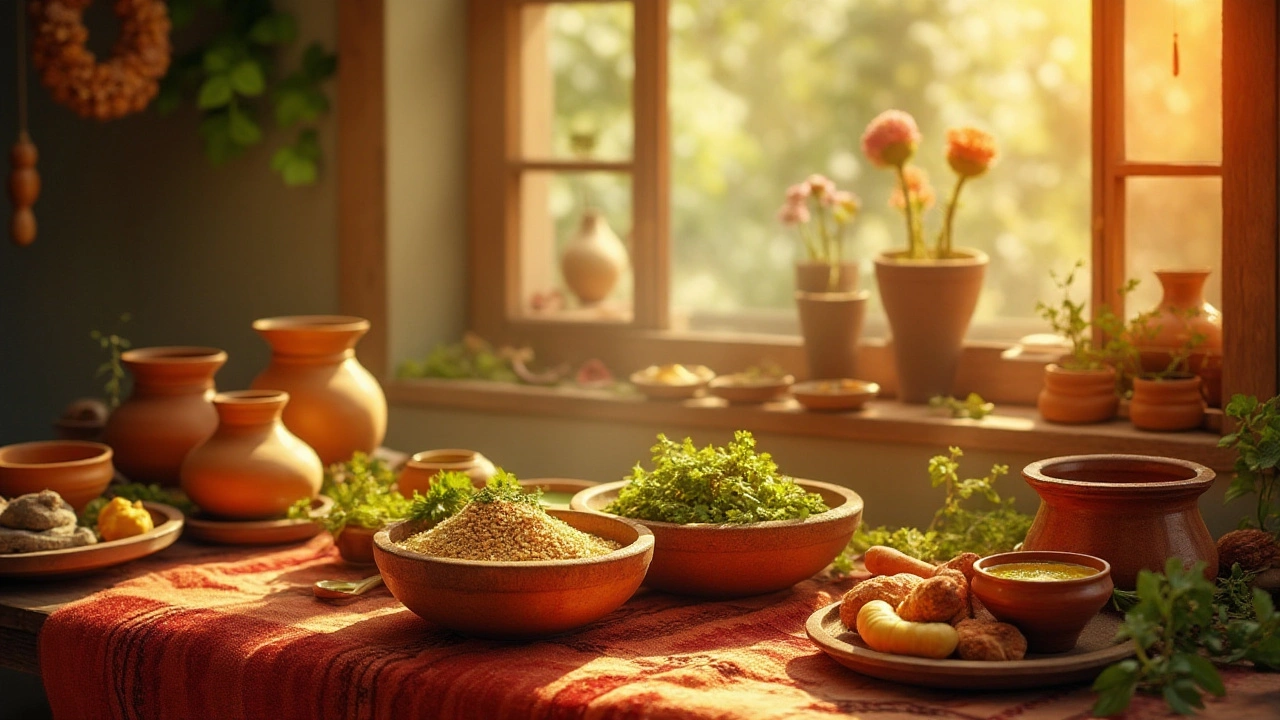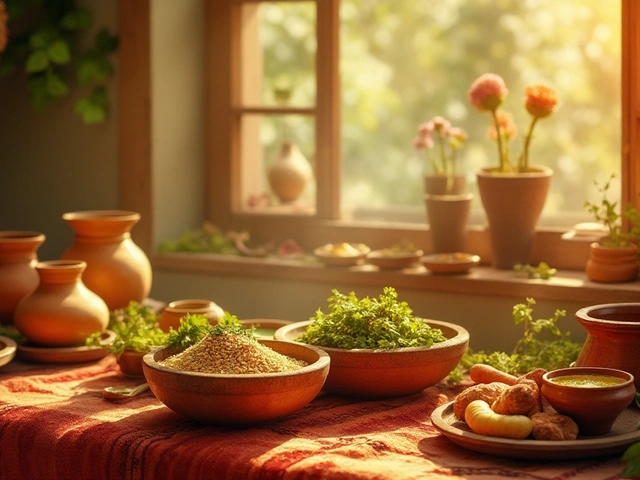In the world of Ayurveda, maintaining the balance of doshas is crucial for overall well-being. Each dosha comes with its unique characteristics, and the key to wellness often lies in managing these traits effectively. For those with a dominant Vata dosha, balance can be a bit of a challenge due to its inherent qualities of movement and change. Fortunately, awareness and intentional choices can make a significant impact.
Vata types should pay attention to their food and lifestyle to prevent imbalance, which can often manifest in various psychological and physiological symptoms. By avoiding certain foods and habits, one can help stabilize the ever-swerving Vata. Dive into this guide to explore how you can navigate through the whirlwind of Vata with poise and ease.
- Understanding Vata Dosha
- Foods to Avoid for Vata
- Lifestyle Choices to Steer Clear Of
- The Role of Routine in Vata Balance
- Tips for a Vata-friendly Lifestyle
Understanding Vata Dosha
Ayurveda, a time-honored medical system from India, identifies three primary bio-energetic forces known as doshas: Vata, Pitta, and Kapha. Of these, Vata is described as the driver of movement in both the body and mind. Comprised of the elements of air and ether, Vata is often associated with qualities like lightness, dryness, coldness, and mobility. These attributes contribute to the unique characteristics and tendencies of those with a Vata dominance. It's said that a balanced Vata dosha can manifest in creativity, energy, and adaptability. However, when out of balance, it might lead to restlessness, anxiety, and a host of physical discomforts.
The dynamic nature of Vata is evident in both the environment and within individuals, particularly in aspects such as energy levels, mood, and digestion. Vata types often excel in roles that require creativity and quick thinking. However, maintaining a balanced state involves keeping these airy qualities in check, lest they spin out of control. This requires steady nurturing, routine, and an understanding of how these elements play a role in day-to-day life. According to Dr. Vasant Lad, a respected Ayurvedic practitioner, "Vata is the pioneer of our body. It initiates everything in our biological mechanisms."
Recognizing these signs of imbalance early on plays a critical role in managing one's health. Typical symptoms of a Vata imbalance can include digestive disorders such as constipation and bloating, dry skin and hair, sleep disturbances, and fluctuating energy levels. These symptoms call for targeted interventions that emphasize grounding and warming activities. Importantly, stress management techniques can be a game-changer in keeping Vata stable. Some basic stress-reducing strategies include Yoga, meditation, and breathing exercises, which help to calm a jittery mind.
Demystifying the core tenets of Vata helps in making informed lifestyle choices. Known for quick movements and rapid thought processes, Vata-dominant individuals often need stability and nourishment. This means including more oil-rich and hydrating foods in their diet while avoiding those that increase dryness and mobility. As Sarah Fields, an expert nutritionist, echoes, "Grounding foods with a stable routine are Vata's best friends." Additionally, adopting a routine that emphasizes regular rhythms can hold transformational potential for those seeking balance in all areas of life. While modern life does pose challenges to sticking to a routine, making an effort is often highly rewarding.
Foods to Avoid for Vata
Understanding the unique needs of the Vata dosha is pivotal for anyone looking to harmonize their mental and physical state. Vata is often associated with qualities such as coldness, dryness, and lightness, which means that specific dietary choices can either exacerbate or mitigate these inherent traits. For those with dominant Vata, steering clear of certain foods can significantly enhance their wellbeing. Cold, raw foods like salads can spike the Vata imbalance, leaving one feeling unsettled and uncomfortable. Instead of the vibrant allure of a fresh green salad, consider opting for warm, cooked vegetables or soups, which can provide grounding warmth.
Avoidance of excessively spicy foods is also crucial. Spices such as peppers and mustard seed can be aggravating for Vata, sparking excessive heat that can lead to symptoms like anxiety and insomnia. While flavors do add joy to meals, going subtly can help keep Vata in check. Opt for gentle spices like cumin, ginger, and fennel, which offer warmth without overwhelming the digestive system. A stable digestive system contributes to balanced Vata energy, preventing the swings between excitement and tiredness that often plague Vata types.
"Incorporating opposite qualities into your lifestyle is a key principle of Ayurveda." – Dr. Svoboda
Additionally, caffeinated beverages such as coffee, known for their stimulating effects, can drive the flighty nature of Vata into overdrive. While that morning coffee might seem essential, it can push your natural flightiness into hyperactivity. If reducing caffeine seems daunting, consider substituting with herbal teas, specifically warming varieties like ginger or chamomile, which offer the comfort of a warm drink without the side effects.
Sugary foods and refined carbohydrates, sweet on the surface but often a sneaky antagonist for the Vata constitution, should be limited. Such foods can lead to erratic energy levels, causing the nerves to jangle and mood to fluctuate. Instead, look toward natural sweeteners like honey, which, in moderation, can satisfy those sugar cravings without the associated crash. The smooth, consistent energy derived from whole grains such as oats, quinoa, and rye is beneficial for Vata stability.
Finally, it's wise for those with a dominant Vata to temper their intake of dried fruits and nuts, despite their nutritional value. These foods, when consumed excessively, mirror Vata's dry nature, creating unneeded imbalances. Rehydrating dried fruits prior to consumption can make them more suitable, and choosing nuts that are slightly warmed and spiced can enhance their digestibility.

Lifestyle Choices to Steer Clear Of
Living with a dominant Vata dosha can sometimes feel like riding a wild wind. To maintain balance, it’s crucial to align your lifestyle with the grounded energy Vata lacks. The choices we make daily impact our physical health and emotional wellbeing significantly. One important lifestyle area to address is sleep. Vata types often struggle with restlessness, which can lead to insomnia. Prioritizing a consistent bedtime routine can help, as staying up late or irregular sleep patterns can exacerbate Vata imbalances.
Another aspect to consider is the pace of life. Vata thrives on movement and change, but too much inconsistency can throw you off balance. Aim to establish a regular daily routine. This can offer the predictability that helps ground the airy and light nature of Vata. Avoid multitasking too often as it can lead to scattered energy. Focused activities help channel Vata's energy productively. Also, creating a calm and stable home environment is beneficial.
Vata individuals should be wary of overstimulation. This temperamental dosha can easily become overwhelmed by excessive sensory input. Try to minimize exposure to loud noises, bright lights, and crowded places. Instead, prefer tranquil surroundings and take time for calm, solitary activities like reading a book or meditating. To quote the renowned Ayurvedic practitioner Dr. David Frawley,
"Vata individuals need to find stillness, constancy, and nourishing experiences to create inner peace."
Another pitfall is irregular eating habits. Vata dosha benefits from regular meal times. Skipping meals or eating at odd hours can disturb the digestive fire, or agni, leading to issues like bloating and gas. Make an effort to eat warm, cooked meals during regular intervals to keep your digestion in harmony. It's beneficial to avoid food that's too cold, dry, or raw, as it may aggravate Vata's intrinsic qualities.
Travel can also be unsettling for Vata types. If possible, reduce exposure to frequent travel, as it disrupts routine and creates instability. When travel is necessary, bring elements of home with you. A favorite blanket, a familiar herbal tea, or a calming essential oil can help maintain a sense of stability. Finally, Vata individuals should be careful with exercise. While activity is important, excessive or high-intensity exercise can aggravate Vata. Gentle, grounding exercises like yoga, walking, or tai chi can promote balance without overwhelming the system.
The Role of Routine in Vata Balance
Creating a daily routine is vital for those with a dominant Vata dosha, as this helps ground their naturally dynamic and restless energies. The Vata dosha thrives on regularity because its inherent nature leans towards irregularity, unpredictability, and change. Establishing a structured framework in daily activities—from waking up, eating, exercising, working, to sleeping—can work wonders for stabilizing Vata. By doing so, one can reduce the physical and mental disturbances often associated with Vata imbalance, such as anxiety, constipation, or fatigue.
One of the primary aspects to consider is the timing of meals. Vata types benefit from eating at regular intervals throughout the day. This helps maintain digestive efficiency and prevent the dips in energy they are prone to. Ideally, meals should occur at the same time each day, allowing the body to anticipate food intake, which is calming for the Vata mind and body. It's also beneficial to include grounding and nourishing foods, focusing on warm, moist, and slightly oily dishes that calm Vata's natural dryness and coldness.
Exercise should be calming and grounding, such as yoga or tai chi, rather than high-intensity workouts, which might further amplify Vata's active nature. Maintaining consistency in exercise routines not only supports physical health but also instills mental clarity. Alongside this, engaging in regular meditation or breathing exercises can prove effective in settling the mind's whirlwind of thoughts. Adopting a bedtime routine is essential. Strive to go to bed and wake up at the same time each day. This rhythm helps in aligning the body's natural circadian cycles, promoting restorative sleep and reducing the mental overstimulation that Vata types often experience.
"Vata requires rhythm and consistency in its routine," highlights Dr. Robert Svoboda, an esteemed Ayurvedic educator. "Without it, their natural enthusiasm can easily convert into restlessness."
It's crucial to carve out personal time during the day, devoid of any digital distractions. A simple thirty-minute stroll in nature or quiet reading can be incredibly nourishing for the Vata psyche. A space devoid of hurriedness and urgency, where one can breathe deeply and attune their senses, works wonders. Supplement these efforts by having a warm oil self-massage, or Abhyanga, a practice highly recommended in Ayurveda to calm Vata. Gently warming sesame or almond oil and massaging it onto your skin cultivates calmness, rehydrates the skin, and anchors the mind.
To illustrate, let's consider a typical Vata-friendly schedule. Begin your day with a mindful morning ritual: wake up by 6 am, drink a warm glass of water, and practice gentle yoga for twenty minutes. Keep breakfast balanced and wholesome by 8 am. Mid-morning dedicates time to tasks requiring creativity, as Vata tends to be most alert at this time. Lunch should be your largest meal, aimed around noon, followed by a light afternoon schedule. Afternoon tea or snack can rejuvenate energy levels until dinner, ideally before 7 pm. Wind down with calming activities like reading or listening to music, ensuring lights out by 10 pm.

Tips for a Vata-friendly Lifestyle
Finding harmony in the whirlwind of a Vata lifestyle involves embracing warmth, consistency, and mindful choices. Begin by focusing on creating a daily routine that interlaces seamlessly with nature's rhythms. This routine should not be a strict regimen but rather a reliable guide that provides structure to your day. Rising and sleeping around the same time brings stability to an otherwise erratic Vata nature. Opt for gentle morning awakenings and soothing bedtime rituals that prepare your mind and body for rest. Consider meditative practices or light stretches to ground yourself and enhance your connection to the present moment.
Nutrition plays a pivotal role in balancing Vata. Embrace warmth in both food and drink, opting for warm, cooked meals that comfort the usually light and cold nature of Vata. Soups, stews, and herbal teas can become delightful staples. Avoid snacking on raw, cold foods and instead engage with seasonal produce that aligns with your body's needs. Adding spices like ginger and cinnamon brings an extra layer of warmth and can be a wonderful way to stir up your culinary adventure. Staying hydrated is vital, yet focus on warm beverages that complement the balance-seeking Vata energy.
The environment you cultivate can either alleviate or exacerbate Vata imbalances. Create a sanctuary at home that feels secure and grounding. Warm lighting, soft textures, and calming colors will ease the overactive mind often characteristic of Vata. A clutter-free space allows your thoughts to flow more freely and less chaotically. As you venture out into the world, remember to dress warmly, especially when the weather turns cold. Layers are your allies, as they can be adjusted to maintain an optimal body temperature, further promoting inner balance.
Participating in calming activities counters the restlessness that Vata can bring. Encourage creativity through gentle arts like painting, knitting, or journaling. These activities ground thoughts and are soothing. Yoga and tai chi offer both mental and physical benefits, grounding your energy and aligning your body and mind. What's more, these practices focus on breathwork, which is instrumental in centering the airy nature of Vata. Remember, the key is not intense exertion but rather measured movement that fosters flow.
In the journey of managing Vata dosha, vulnerability to stress is a significant consideration. It's beneficial to adopt stress-reducing techniques such as deep breathing, guided imagery, or even a purposeful walk in nature. As suggested by Ayurvedic scholar Vasant Lad, "The mind is like the wind. It carries the aroma of a flower garden or the odors of a junkyard," reminding us that our mental surroundings influence our wellbeing directly. Regular self-care routines like massages or baths enriched with essential oils provide an opportunity to unwind, promoting a deeper connection to oneself.








